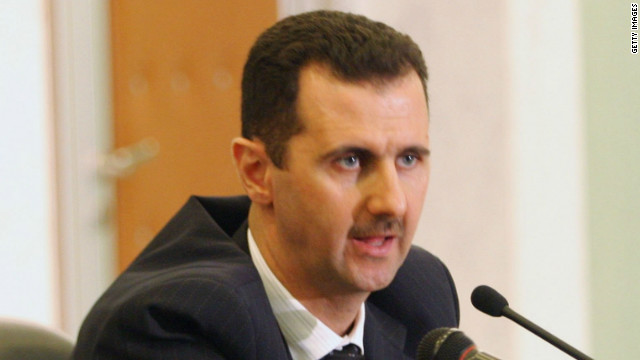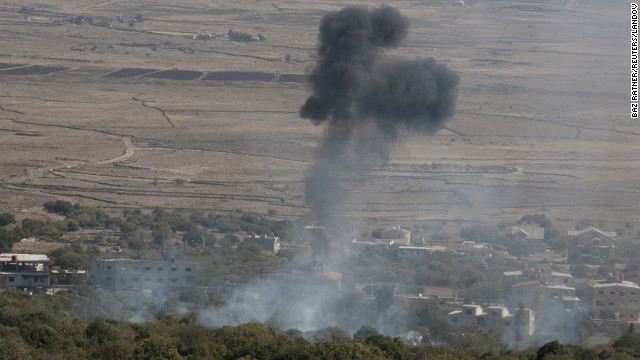November 8, 2012 -- Updated 2012 GMT (0412 HKT)

Defiant Assad: I'm not a puppet
STORY HIGHLIGHTS
- NEW: Car bomb blast in Damascus countryside, no word on deaths
- The Red Cross says it's struggling to cope with Syria's worsening humanitarian situation
- Russian media: Bashar al-Assad warns of a "domino" effect from the Atlantic to the Pacific
- The Syrian National Council announces a new body to include "all opposition groups"
"I'm not a puppet, and I was not made by the West to go to the West or to any other country," he told Russia Today TV. "I am Syrian. I was made in Syria and to live and die in Syria."
He also made an ominous threat against foreign intervention, saying it would have a "domino impact" on the world.
"I think that the cost of
foreign invasion of Syria, if it happened, would be greater than one
that the whole world can afford," he told Russia Today. "Because if
there were problems in Syria, particularly as we are the last bastion of
secularism, stability and coexistence in the region, it will have a
domino impact that will affect the world from the Atlantic Ocean to the
Pacific Ocean.

Photos: Showdown in Syria
"And you know its
implications on the rest of the world. I do not think that the West is
moving in this direction, but if they do, no one can predict what will
happen after."
Al-Assad's comments came
after British Prime Minister David Cameron broached the idea of giving
him "safe passage" if that's what it takes to stop the bloodshed in
Syria.
"Anything, anything to
get that man out of the country and to have a safe transition in Syria,"
Cameron told Al-Arabiya TV. "Of course I would favor him facing the
full force of international law and justice for what he's done. I am
certainly not offering him an exit plan to Britain, but if he wants to
leave, he could leave; that could be arranged."
Even Tunisia, the first
country in the region last year to oust its longtime ruler, has offered
asylum to al-Assad in an attempt to prevent further violence.
Meanwhile, a prominent
Syrian opposition group and Western leaders are trying to unite the
opposition to form an alternative to al-Assad's government.
But while the Syrian
National Council is trying to maintain a majority rule in unification
efforts, the West is trying to dilute the group's dominance.
Once viewed by Western
countries as "a legitimate representative of the Syrian opposition," the
SNC scrambled to regroup after Western leaders said it should no longer
be the face of the Syrian rebellion.
The SNC announced the
formation of a "national conference" in which "all opposition groups
participate, with SNC having the highest percentage of representation."
"The National Conference
shall consist of 300 participants from the SNC, local councils in the
liberated areas, defected technocrats, independent opposition groups and
national armed resistance groups under the umbrella of the (rebel) Free
Syrian Army," the group said.
Representatives from
Britain, France, the United States and Turkey are meeting in Qatar
Thursday to try to ensure Syria's opposition is represented by more than
just the Syrian National Council.
"Our objective is to
encourage Syria's opposition groups to unite around a vision for a
democratic and stable Syria," British Foreign Secretary William Hague
said in a statement. "This is necessary to offer the Syrian people a
credible alternative to the Assad regime and to achieve an inclusive
political transition that ends the appalling bloodshed and reflects the
will of the Syrian people."
Meanwhile, Turkey urged
the international community to do more to support Syrian-led efforts to
resolve the crisis, and warned against further delay.
"There is not a moment
to lose," Turkish Foreign Minister Ahmet Davutoglu told delegates in
Doha, Qatar, Thursday, according to Turkey's semiofficial Anadolu news
agency.
The Doha meeting comes
after U.S. Secretary of State Hillary Clinton said the SNC -- which
consists largely of expatriates -- should no longer be considered the
"visible leader" of efforts to form a new government. Clinton said the
opposition must include seats for "those who are on the front lines
fighting and dying today."
The inability so far to create a unified opposition
front has helped prolong Syria's bloody conflict, which has claimed the
lives of more than 32,000 people over the past 20 months.
In other developments:
The Red Cross is unable
to "cope" with the increasingly deteriorating humanitarian situation in
Syria, Peter Maurer, president of the International Committee of the Red
Cross, said in Geneva, Switzerland, Thursday.
"The seriousness of the
crisis is deepening every day and this trend has been uninterrupted
since the summer," he said. "There are a number of blind spots where we
know no aid has reached the population."
Aid workers have to
contend with a complex situation and obstacles on the ground that
include security threats and military or bureaucratic restrictions on
access, ICRC spokeswoman Carla Haddad Mardini said.
"We try to fill the cracks which open, and whenever we have an opportunity to deliver aid, we go ahead," Maurer said.
At least 64 people have
died in Syria so far Thursday, according to the Local Coordination
Committees, an opposition activist network. Of those, 22 were killed in
Damascus and its suburbs, the LCC said.
A car bomb exploded in
Sayda Zainab, a neighborhood in the Damascus countryside, according to
the Syrian Observatory for Human Rights, a London-based opposition
group. There was no immediate information on how many people were
killed. Saida Zaynab is home to a historic Shia shrine that draws
thousands of pilgrims every year.
Fighting between
loyalist Syrian forces and fighters from the Free Syrian Army also raged
along Syria's border with Turkey, leading Turkish authorities to close
schools in the border town of Ceylanpinar.
The Syrian Observatory
for Human Rights also said at least 10 rebels and 16 Syrian troops were
killed on the Syrian side of the border, in Hasaka province. Some rebels
entered Syria from Turkey and engaged the Syrian army in clashes, the
group said.
At the same time,
Turkish President Abdullah Gul said his country was drawing up
contingency plans with the NATO military alliance to fortify its border
with Syria.
Gul told reporters
Thursday that because of the ongoing civil war in Syria and its possible
repercussions for NATO member Turkey, every measure was being
considered to counter the risks. Turkish and international media have
reported in recent days those options include the installation of
Patriot missiles along the border, something Prime Minister Recep Tayyip
Erdogan denied Wednesday.
Several stray mortar
rounds and a tank shell landed Thursday in the Golan Heights -- captured
by the Jewish state from Syria in the 1967 Six-Day War -- as a result
of fighting inside Syria, according to the Israeli military.
One of the shells landed
in the Israeli settlement of Alonei HaBashan, but there were no reports
of damage or injuries, the Israeli military said.
CNN's Arwa Damon, Ivan Watson and Salma Abdelaziz contributed to this report.

No comments:
Post a Comment